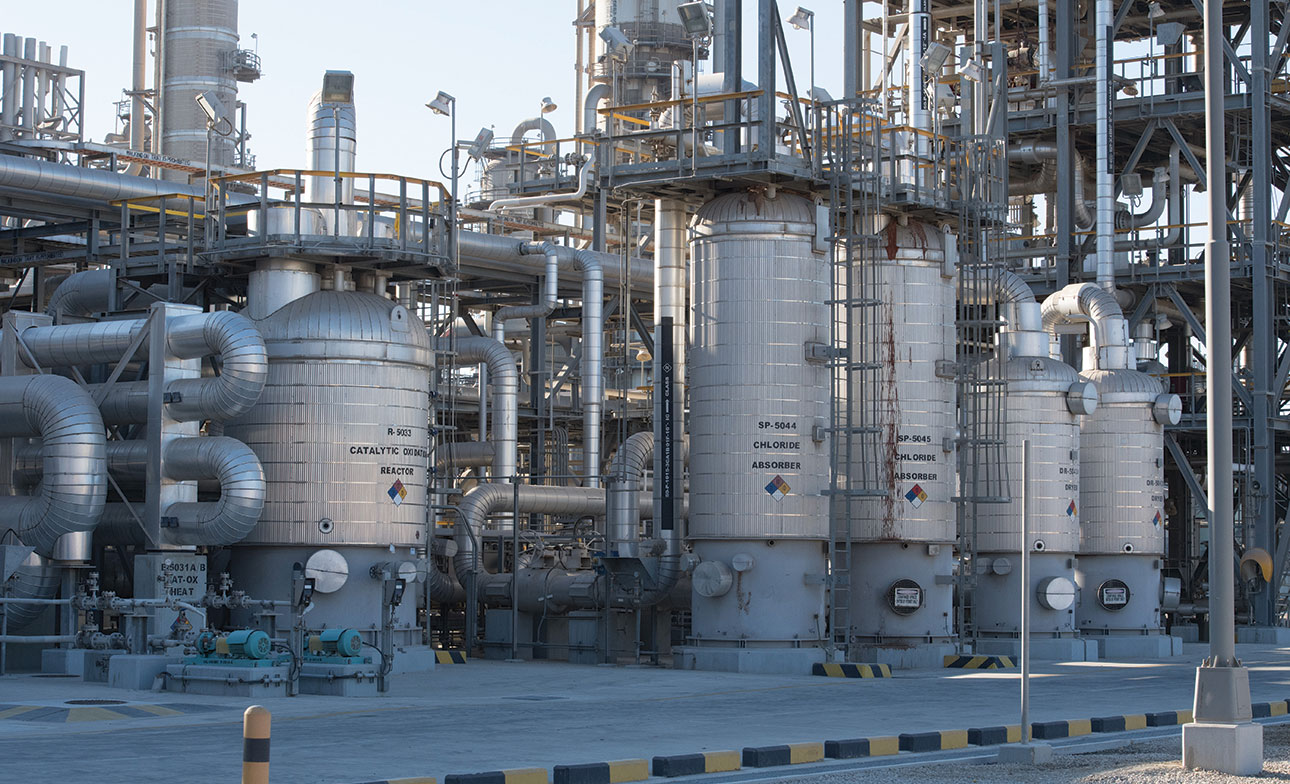RISK AND EMERGENCY RESPONSE MANAGEMENT
PROCESS SAFETY KNOWLEDGE AND COMPETENCY
We have linked our strategic objectives to process safety, knowledge, and competency development, as well as to risk discovery and management, emergency preparedness and response, and technical network support. In 2021, we focused on strategic EHSS initiatives to support the development of human capital and conducted a number of online engagements and virtual programs to promote learning. Through our continued work with the Mary Kay O-Conner Process Safety Center, during 2021:
- 23 engineers graduated from Developing Level Batch 4 training
- 13 engineers enrolled in Proficient Level Batch 1 training
- 28 engineers enrolled in Developing Level Batch 5, with 7 from non-SABIC companies
- 97 professionals attended the Fundamentals of Process Safety training program
- 92 employees participated in Layer of Protection Analysis online trainings
- 173 subject-matter experts were trained in emergency preparedness, with particular emphasis on pre-incident planning
IMPROVING RISK DISCOVERY AND MANAGEMENT
During 2021, we emphasized pre-incident planning to identify high-risk scenarios. Our teams developed 214 pre-incident plans that spanned all SABIC sites in the MEA region. In line with our EHSS 2025 strategy, we continued to strengthen the SABIC Assurance for EHSS Risk (SAFER) structure and work processes to ensure consistency and visibility through effective implementation verification, end user networking and engagement, and IT enablement. We also trained 121 SABIC employees, including senior managers and subject-matter experts, on the SAFER program.

Our Emergency Response & Fire Protection function conducts drills and is constantly working on improving planning and readiness capabilities.
LOSS OF SECONDARY CONTAINMENT RELEASES (LOSC) (HAZARDOUS SUBSTANCES)
Due to changes in the definition of our incident management standard, we have decided to remove historical data prior to 2020. The graph below shows releases of Hazardous Chemicals from ABC Environmental/PSE (Tier 1 and 2 incidents), resulting in LOSC.
TOTAL RELEASES OF HAZARDOUS SUBSTANCES (LOSC)
* Assured by KPMG.
The number of hazardous substances release incidents fell in 2020 due to the introduction of Process Safety Incidents (Loss of Primary Containment) as the main incident type (SHEM-10 revision). An incident is considered an environmental incident if the released substance is going out of the secondary containment and if there is an actual consequence and/or impact to the environment (air, soil, water). Released quantities dropped due to leak preventive measures being implemented immediately and adequate cleaning by the sites, as embedded in their Operating Management Procedures, prevented the further spread of hazardous chemical substances and minimized the impact on the environment (air, soil, water).
OUR ENVIRONMENT
ENVIRONMENTAL STEWARDSHIP
We continued our engagement with the world’s leading chemical associations, including, among others, the Gulf Petrochemicals and Chemicals Association (GPCA), the European Chemical Industry Council (CEFIC), the American Chemistry Council (ACC), the Association of International Chemical Manufacturers (AICM), and others in order to share best practices and to influence industry-level change toward more sustainable outcomes. SABIC’s involvement in the Operation Clean Sweep® initiative is one such effort toward helping eradicate marine litter and microplastics in waterways.
REGULATORY ENGAGEMENT
During 2021, we evaluated the potential impacts of global regulatory changes, and engaged with local and global regulators such as the Saudi Ministry of Environment, Water and Agriculture, the Royal Commission for Jubail and Yanbu, and the European Union to assess our readiness and commitment toward environmental protection.
ENVIRONMENTAL RELEASES AND EMISSIONS MANAGEMENT
WATER
We make every effort to implement effective solutions to conserve natural resources, while minimizing environmental impact pertaining to water management. An inventory is maintained of all wastewater sources and their characteristics. Complete drawings are available of the sewer systems, potable/body contact water, process water, and on-site wastewater treatment. Reliable sampling, monitoring, record keeping, and reporting processes are operational to obtain and analyze representative samples for process quality and compliance. We have also established processes to periodically identify potential for optimizing water usage, including the potential for maximizing re-use of water. Detailed storm water pollution prevention plans have been developed and corrective actions needed to minimize any risks have been established.
WASTE
We are cognizant of the fact that effective waste management practices and shifting toward sustainable waste management and circular economy are vital to mitigate our environmental footprint. Therefore, our corporate functions observe a waste prevention hierarchy that either controls or influences this environmental aspect. Moreover, waste minimization plans are in place to identify opportunities to reduce waste generation. Our technical teams explore all options to eliminate, reduce, lower the toxicity, reuse, or recycle our waste, and when that is not possible, we prioritize recovery options.
ENHANCING ENVIRONMENTAL COMPETENCY
Environmental competency development programs are critical to maintain the right balance of knowledge within each organization and to ensure new recruits receive specific environmental knowledge required in their jobs. In 2021, we successfully executed the NEBOSH competency development training program for environmental subject-matter experts at affiliates in Saudi Arabia as a part of our EHSS strategy execution. Two sessions were conducted in 2021 for 30 environmental experts.
BEYOND COMPLIANCE
WASH PROGRAM
One of SABIC’s UN Sustainability Development Goal commitments is the sixth goal, “Clean Water and Sanitation”. Additionally, SABIC is a signatory to the World Business Council for Sustainable Development (WBCSD) Pledge on Access to Safe Water, Sanitation, and Hygiene (WASH).
To implement WASH Pledge requirements at the workplace, SABIC embedded it in its Operation Management Standards (OMS). The program is in its implementation phase in all SABIC regions and is expected to achieve a minimum setup target (rating of 1.8, that is, 90% of the pledge requirements) as part of the SABIC's manufacturing strategy.
OPERATION CLEAN SWEEP® INITIATIVE
Operation Clean Sweep® (OCS) is an initiative that supports the plastics manufacturing value chain in implementing sound practices with regards to pellets, flakes, and powder handling, and maintenance of industrial sites. SABIC committed to this program when it was originally launched in the US by the American Chemistry Council (ACC) and has been actively implementing it across all regions over the past few years. In 2021, we were recognized as a partner of the OCS program in MEA after we extended our commitment to the Gulf Petrochemical and Chemical Association (GPCA) Responsible Care® initiative by signing the Association’s regional pledge.
During 2021, we performed a global gap assessment across all our manufacturing sites to identify common challenges and share good practices and engineering solutions. We also extended the OCS program to two SABIC technology center sites, provided training to supply chain, sales, and logistics teams, and engaged with other companies and associations to include more checks on OCS implementation. We also plan to include it as part of our supplier qualification in 2022.

We performed a global gap assessment across all our manufacturing sites to identify common challenges and share good practices and engineering solutions.
SECURITY MANAGEMENT
SABIC is implementing several security programs, focusing on driving security maturity through security risk assessments at all our locations. Programs include Jadeer for Saudi Arabian sites’ security guards, which is scheduled to go live in 2022. It also includes improvements to the digital ID system, including a unified contractor ID and a 12-hour shift control, to reduce employee stress and comply with local regulations.
Security Incidents
CRISIS MANAGEMENT AND COVID-19
Our crisis management teams remained alert to respond to the COVID-19 pandemic and weather- related emergencies. Access controls were introduced at sites to limit the possibilities of COVID-19 exposure. As travel gradually resumed, our regional and global security personnel worked with cross-functional groups on conducting global travel risk assessments. Our regional crisis management teams also conducted site-based and region-wide exercises focusing on both the pandemic and cybersecurity. These exercises helped raise awareness, ensure preparedness, and contributed to business continuity planning. We also set up a Global Crisis Management Network of senior management from EHSS, Human Resources, Corporate Affairs, and Legal Affairs who met regularly to discuss crisis management strategies, learned from each other's experiences, and shared best practices.
EMERGENCY DRILL AT ROYAL COMMISSION PIPELINE CORRIDOR (RCPC)
As part of SABIC’s Responsible Care® commitment towards neighboring sites and community readiness and awareness, SABIC successfully conducted a major off-site drill to test our Integrated Emergency Response and Crisis Management Plan. The primary objective of the exercise was to test the Plan for SABIC, non-SABIC companies, and government agencies, such as the Royal Commission and Civil Defense in Saudi Arabia, in the event of flammable gas being released from the 10” butane line, which could result in a fire at RCPC. A second objective was to raise awareness on the role and responsibility of internal and external stakeholders.
